|
|
|
Sort Order |
|
|
|
Items / Page
|
|
|
|
|
|
|
| Srl | Item |
| 1 |
ID:
120718
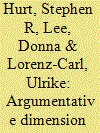

|
|
|
|
|
| Publication |
2013.
|
| Summary/Abstract |
Abstract Not only is the participation of developing countries in international trade negotiations growing, so is their influence over the global trade agenda. This article highlights the increasing activism and impact of African states through a detailed study of the current Economic Partnership Agreement (EPAs) negotiations with the European Union (EU). In examining African resistance to EPAs, the article develops a constructivist approach to North-South trade negotiations that pays close attention to the role of development discourses. We argue that the growing willingness of African states to challenge the EU to deliver on its development promises during the decade-long EPA process was crucial to informing their sustained opposition to the EU's goal of completing a comprehensive set of sub-regional economic agreements. We document African resistance to EU trade diplomacy in the EPAs, exploring how these otherwise weak countries were able to pursue normative-based negotiation strategies by recourse to the EU's promise of a 'development partnership.'
|
|
|
|
|
|
|
|
|
|
|
|
|
|
|
|
| 2 |
ID:
173298
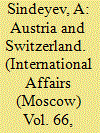

|
|
|
|
|
| Summary/Abstract |
THE WORLD ORDER is undergoing yet another transformation, and one whose result is hard to foresee.1 Europe is getting ready to get involved in rivalries among options for globalization, and this means it is again important for scholars to take up something that until recently was in danger of becoming a peripheral area of research - holistic studies of individual countries, including analysis of behavior models of smaller states and their desire and resources for relationships with larger actors.
|
|
|
|
|
|
|
|
|
|
|
|
|
|
|
|
| 3 |
ID:
153442
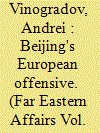

|
|
|
|
|
| Summary/Abstract |
December 11, 2016 marked the 15th anniversary of China becoming a member of the World Trade Organization. According to the Chinese, this date is grounds for automatically granting China the status of a country with a market economy. What has changed in relations between China and the countries of the European Union since that date, and what is behind the European countries' hesitation to grant China this status? How are the results of the referendum in Great Britain influencing relations between China and the European Union? What are the prospects for the European Union and the United States concluding a Transatlantic Partnership trade agreement, and how will China's position in Europe be affected as a result? These questions and others are examined in this work.
|
|
|
|
|
|
|
|
|
|
|
|
|
|
|
|
| 4 |
ID:
174962
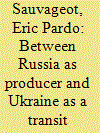

|
|
|
|
|
| Summary/Abstract |
Between 2014 and 2015, the EU started a new energy policy in order to address, among other issues, the problematic character of energy interdependence with Russia, and thus improve its energy security. The aim of this article is to determine how this policy considered interdependence with Russia in the light of diversification alternatives. Energy security is seen through short-term and long-term dimensions, which can be equated to the concepts of vulnerability and sensitivity interdependence. As the article shows, the alternative of LNG is limited by production and consumption patterns in both Europe and other world markets. It also shows that maintaining interdependence with Russia and reducing the role of transit countries such as Ukraine would yield benefits both in vulnerability and sensitivity interdependence. However, while the EU has strongly based its rhetoric on the promise of LNG, it has ignored alternatives that would maintain interdependence with Russia. Eventually, the EU's energy strategy has acknowledged the limitations of LNG, even though it has not changed its stance towards Russia. In that respect, it seems fair to conclude the EU has not rigorously analysed the transit dimension in its interdependence with Russia and the implications for its energy security.
|
|
|
|
|
|
|
|
|
|
|
|
|
|
|
|
| 5 |
ID:
188804
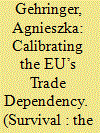

|
|
|
|
|
| Summary/Abstract |
As the energy crisis triggered by the Russian war against Ukraine vividly demonstrates, the EU suffers from inconvenient external dependencies. The trade dependence on China, the European Union’s main source of imports, could be an acute source of strategic vulnerability for the EU economy. Given the evident risks in maintaining close economic relations with authoritarian regimes, a policy change is needed to address the EU’s trade dependence, aimed not only at shifting economic incentives for businesses but also at reconciling sustainability goals with geopolitical priorities.
|
|
|
|
|
|
|
|
|
|
|
|
|
|
|
|
| 6 |
ID:
159286
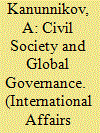

|
|
|
|
|
| Summary/Abstract |
THE WORLD faces a range of problems, among them new infectious diseases, growing poverty, environmental pollution, climate change, depletion of vital non-renewable energy resources, and dwindling reserves of drinking water. These problems affect everyone in the world and cause wide-scale concern, with civil society being one of the channels through which such concern is expressed.1 It is increasingly often argued that such problems cannot be solved without a system of global governance that would be based on values shared by people of all cultures, political views, religious beliefs, and philosophical principles. Not accidentally, this is one of the issues on the agenda of the United Nations - the organization has a specialized body for this purpose, the Commission on Global Governance.
|
|
|
|
|
|
|
|
|
|
|
|
|
|
|
|
| 7 |
ID:
098464
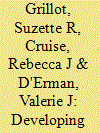

|
|
|
|
|
| Publication |
2010.
|
| Summary/Abstract |
This article examines how external third parties, particularly international organizations, can facilitate the development of security community and international integration within post-conflict societies. Focusing on seven countries in the Western Balkan region, this study offers unique insight into how and why feelings of trust and a sense of community can be encouraged by external actors - the EU and NATO in this case - and how and if trust and community can filter down to the most local levels within post-conflict societies. Ultimately, we argue that both the EU and NATO have, primarily through membership requirements to engage in regional interaction and cooperation, significantly contributed to the development of security community among Western Balkan neighbors at the elite level. However, we also find that feelings of trust and belongingness are still very much lacking among the general population of the Western Balkan region. Such insights will further efforts to enhance conflict resolution and post-conflict reconstruction in the Western Balkans and elsewhere.
|
|
|
|
|
|
|
|
|
|
|
|
|
|
|
|
| 8 |
ID:
151315
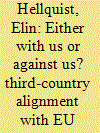

|
|
|
|
|
| Summary/Abstract |
Since the mid-1990s, selected neighbours have in impressive numbers aligned with European Union (EU) foreign policy sanctions. However, much more than for any other sanctions case, neighbours have declined joining recent measures against Russia/Ukraine. This article uses freshly gathered data from the entire period of the Common Foreign and Security Policy (CFSP) to analyse how the practice of alignment influences international relations in Europe. Thereby, the article demonstrates that: (1) sanctions are not a two-party game, but an instrument that impacts broadly on relations with third countries; (2) alignment with sanctions not only articulates similarity, but contributes to normative polarization in wider Europe; (3) for a high-salience case such as Russia sanctions, neighbours are reluctant to be instrumentalized for EU foreign policy purposes.
|
|
|
|
|
|
|
|
|
|
|
|
|
|
|
|
| 9 |
ID:
159780
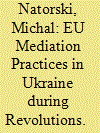

|
|
|
|
|
| Summary/Abstract |
This article compares two different experiences of EU engagement in mediation in Ukraine: the Orange Revolution in 2004 and the Euromaidan crisis in 2013–2014. This comparison reflects two different outcomes of EU mediation practices under similar circumstances of political conflict between domestic political actors. The changing degree of collective EU authority recognized by other actors is the main driver behind varying EU mediation practices and outcomes. Authority conferred on the EU as a collective actor represents the legitimacy of its power, resources and competence to conduct mediation. However, such authority is always circumscribed by crisis-specific circumstances and volatile configurations of forces. Therefore, differing degrees of authority explain shifts in the effectiveness of EU mediation. To capture the authority of EU mediators in specific crisis situations, this article employs and interprets firsthand accounts of the experiences of actors directly involved in mediation.
|
|
|
|
|
|
|
|
|
|
|
|
|
|
|
|
| 10 |
ID:
197394


|
|
|
|
|
| Summary/Abstract |
The European Union (EU) is deepening its political and security engagement in the so-called Indo-Pacific mega-region. Aside from alluring economic drivers, this article argues that growing suspicion vis-à-vis the People’s Republic of China (PRC) has been accompanied by a multilayered set of ententes with “like-minded” Asia-Pacific partners, starting with the United States of America (US), all the way to Japan, South Korea, and Australia. This effort has been facilitated and hastened by US policy under the Biden administration and Russia’s war in Ukraine. On the basis of first-hand elite interviews over the course of many years of fieldwork, as well as documentary evidence, including those in the Japanese language, the article argues that the EU and major member states have recalibrated earlier aspirations for effective multilateralism and strategic autonomy to more forcefully align with a concert of Indo-Pacific counterparts, led by the United States. The case of the EU-Japan strategic partnership is indicative of such trends, as it covers traditional and non-traditional security domains.
|
|
|
|
|
|
|
|
|
|
|
|
|
|
|
|
| 11 |
ID:
182910
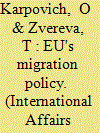

|
|
|
|
|
| Summary/Abstract |
THE development of a common EU migration policy and the approval of the new Pact on Migration and Asylum, proposed by the European Commission (EC) on September 23, 2020, is one of the most important tasks before the EC in 2021 [9]. But even if adopted, the pact would hardly be a breakthrough in efforts to solve the migration problems besetting the EU. To prove this point, we will examine the reasons for the European Commission's continued close attention to migration issues, the nature of the new proposals, and how they are perceived by politicians and the public in EU member states...
|
|
|
|
|
|
|
|
|
|
|
|
|
|
|
|
| 12 |
ID:
109101
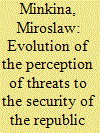

|
|
|
|
|
| Publication |
2011.
|
| Summary/Abstract |
The present study discusses the evolution of threat perception in the area of national security by the analysis of successive strategic documents of the Republic of Poland. After a brief discussion of terms related to security, it goes on to present how the perception of threat changed over the years 1989-2007. It emphasizes that the source of this evolution was Poland's changing internal and external environment. As the article points out, the originally major threat of immediate armed invasion of Poland virtually no longer exists, due to Poland's membership in the North Atlantic Treaty Organization (NATO) and the European Union (EU). Instead, new threats have emerged with the transnational ones being the most serious.
|
|
|
|
|
|
|
|
|
|
|
|
|
|
|
|
| 13 |
ID:
153468
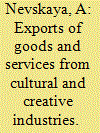

|
|
|
|
|
| Summary/Abstract |
CULTURAL AND CREATIVE INDUSTRIES (CCIs) are increasingly seen as an important driver of economic growth as they enable many countries and companies to become integrated into global value chains and help solve social problems such as unemployment.
|
|
|
|
|
|
|
|
|
|
|
|
|
|
|
|
| 14 |
ID:
173291
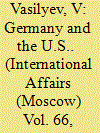

|
|
|
|
|
| Summary/Abstract |
DONALD TRUMP'S TENURE as U.S. president has shaken the Germans' trust in the United States as guarantor of their security and well-being. They are going through a painful and complicated process of trying to comprehend the United States' policy of economic protectionism, its diplomacy of sanctions, and its demands that European nations raise their contributions to NATO's budget to 2% of their gross domestic product (GDP).
|
|
|
|
|
|
|
|
|
|
|
|
|
|
|
|
| 15 |
ID:
103010
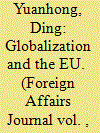

|
|
|
| 16 |
ID:
141764
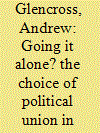

|
|
|
|
|
| Summary/Abstract |
This article explores the inter-related debates over Britain's relationship with the EU and that over the future of the UK. It argues that euroscepticism and Scottish independence are based on exceptionalist identities that now revolve around economic policy. Elite euroscepticism cleaves to a neoliberal vision of minimalist regulation, while advocates of Scottish independence claim Westminster's austerity policies make the British Union incompatible with social democracy. However, this presentation of the choice facing British voters ignores the serious contradictions that overhauling the current order entails. Both forms of exceptionalism fail to recognize the significant limitations of self-government outside and within the EU. If Conservatives can contain their neoliberal flirtation with EU withdrawal they are very well placed to prosper electorally. The dilemma of which union(s) to choose might thus constitute the prelude to the entrenchment of the economic and political order that gave rise to such contestation in the first place.
|
|
|
|
|
|
|
|
|
|
|
|
|
|
|
|
| 17 |
ID:
098797
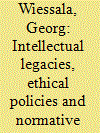

|
|
|
|
|
| Publication |
2010.
|
| Summary/Abstract |
This article investigates EU foreign policies regarding Human Rights with Asia. The perspective adopted here argues for a consideration of selected, social-constructivist, perspectives. The article emphasizes ideas, identities, values, educational exchange and human rights in EU policy towards Asia. Through a number of case studies, the article demonstrates that there is both an 'enabling' and an 'inhibitory' human rights dynamism in EU-Asia dialogue. The article suggests some ways of translating this into policies. It proposes a more inclusive, 'holistic', understanding of human rights discourse in East-West relations.
|
|
|
|
|
|
|
|
|
|
|
|
|
|
|
|
| 18 |
ID:
160613
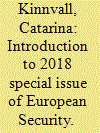

|
|
|
|
|
| Summary/Abstract |
The European Union (EU) faces many crises and risks to its security and existence. While few of them threaten the lives of EU citizens, they all create a sense of anxiety and insecurity about the future for many ordinary Europeans. Amongst these crises are the more obvious challenges of sovereign debt and fiscal austerity; refugees from conflicts in Afghanistan, Iraq, and Syria; and the rise of populist far-right parties across Europe. But behind these challenges lie less visible insecurities about economic prospects, social wellbeing, and a widespread expectation that the EU is unable to answer the challenges of twenty-first century global politics. In other words, the greatest security challenge facing people across Europe is not physical, despite the threats of Putin and ISIS, but is a sense of fear and anxiety over their daily lives.
|
|
|
|
|
|
|
|
|
|
|
|
|
|
|
|
| 19 |
ID:
178692
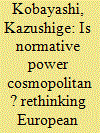

|
|
|
|
|
| Summary/Abstract |
Despite the apparent consensus that European Union (EU) normative power embodies a Kantian cosmopolitan approach to world politics, such a consensus is typically presupposed by scholars, rather than being critically examined by them. By offering macro-historical reflections, this article argues that EU normative power deviates from the Kantian cosmopolitan ideal and in fact replicates the Hobbesian logic of normative homogenization. Renouncing the medieval Vatican’s ambition to construct a united Europe anchored in uniform normativity, Kantian theory celebrates multiple normalcy as the basis for human freedom, perpetual peace, and mutual transformation. In contrast, Hobbesian theory is driven by the conviction that a peaceful value-based community could be built only through normative homogenization, behavioural conformism, and moral unity. In Hobbesian theory, the Leviathan exercises a transformative power to socialize others, eliminate discords, and build a commonwealth through norm diffusion and public education. In this vein, the EU’s aspiration to build a normatively homogenous Europe seems to reflect Hobbes’s vision of normative unity, rather than Kant’s vision of cosmopolitan diversity. Should the EU aspire to pursue a cosmopolitan foreign policy, it needs to pay more attention to the power-political implications of its drive toward normative homogenization and shift its focus from socialization to mutual transformation.
|
|
|
|
|
|
|
|
|
|
|
|
|
|
|
|
| 20 |
ID:
157261
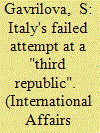

|
|
|
|
|
| Summary/Abstract |
ITALY IS AGAIN at a crossroads. An attempt to carry out a constitutional reform that would have changed the country's political system has fallen through. Italy faces a new political crisis as the ruling party's policy is increasingly rejected both by the opposition and by the population. Where the nation will go from now on depends on a set of factors in its economy and its domestic and foreign policy. To make matters worse, developments in Italy are a source of special concern for the European Union. With the EU being plagued by economic, political and social crises, domestic instability in member countries causes it particular anxiety. The situation in Italy, which is one of the founders and leaders of the EU, exercises a direct effect on the pan-European political climate. Due to the high degree of mutual integration of the economies and political systems of the member countries, political instability in Italy threatens the stability of the EU as a whole.
|
|
|
|
|
|
|
|
|
|
|
|
|
|
|
|
|
|
|
|
|